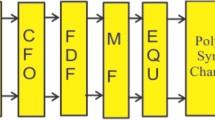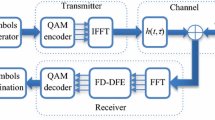Abstract
In the Frequency Division Duplex (FDD) mode of the Third Generation Partnership Project (3GPP) standard, implementation of the turbo decoder, especially for the mobile equipments, faces design decisions related to computational complexity, power efficiency, and memory requirements. In this paper we compare different approaches of low complexity implementation of the turbo decoder, with emphasis on the issues of signal scaling and quantization, the sliding window operation for memory size reduction and the iteration stopping algorithms. The demodulated signal at the output of the RAKE receiver may have a wide dynamic range and it may require many bits of precision. In order to overcome the numerical precision problem and to prevent Log Likelihood ratio (LLR) metric overflow, a scaling algorithm must be used. Our simulation results indicate that the Average Absolute (AA) algorithm using dynamic scaling outperforms other scaling schemes and it is less sensitive to the channel conditions. One of the major challenges in the implementation of a practical turbo decoder is optimization of memory requirements. In this paper we evaluate the performance of the sliding window algorithm using different main and guard window sizes. We show that the bit and block error rate performance of the sliding window scheme mainly depend on the guard window size rather than the main window size. The simulation results indicate that small guard window sizes can significantly decrease the iteration gain for large frames in fast fading channels. Iteration stopping algorithms reduce the power consumption and the latency of the decoder and help to dedicate more resources to other functions of the receiver. The block error distribution in the fading channels makes it even more essential to use an iteration stopping rule. Our simulations conclude that a rule called the minimum absolute value appears to be a very effective, low complexity and robust algorithm.
Similar content being viewed by others
References
C. Berrou, A. Glavieux, and P. Thitimajishima, “Near Shannon Limit Error-Correcting and Decoding: Turbo codes (1)”, in Proc. ICC'93, Geneva, pp. 1064–1070, 1995.
3GPP TS 25.212, V4.1.0, 3rd Generation Partnership Project Technical Specification Group Radio Access Network, Multiplexing and channel coding (FDD), Release 4 2001–2006.
A. Worm, P. Hoeher, and N. Wehen, “Turbo-Decoding without SNR Estimation”, IEEE Communication Letter, Vol. 4, No. 6, pp. 193–195, June 2000.
Y.K. Lee and H. Lou, “Normalization, Windowing and Quantization of Soft-Decision Viterbi Decoder Inputs in CDMA Systems”, Vehicular Technology Conference, IEEE 49th, Vol. 1, pp. 221–225, 1999.
A. Worm, H. Michel, F. Gilbert, G. Kreiselmaier, M. Thul, and N. When, “Advanced Implementation Issues of Turbo-Decodes”, Proc. 2nd International Symposium on Turbo-Codes and Related Topics, Brest. pp. 351–354, September 2000.
H. Michel and N. Wehn, “Turbo-Decoder Quantization for UMTS”, IEEE Communication Letters, Vol. 5, No. 2, pp. 55–57, February 2001.
H. Michel, A. Worn, and N. Wehn, “Influence of Quantization on the Bit-Error Performance of Turbo-Decoders”, Vehicular Technology Proceedings, 2000, VTC 2000-Spring Tokyo. IEEE 51st, Vol. 1, No. 15–18, pp. 581–585, May 2000.
P. Luukkanen and P. Zhang, “Comparison of Optimum and Sub-Optimum Turbo Decoding Schemes in 3rd Generation cdma2000 Mobile System”, WCNC 1999- IEEE Wireless Communications and Networking Conference No. 1, pp. 437–441, September 1999.
M. Marandian; J. Fridman, Z. Zvonar, and M. Salehi, “Performance Analysis of Sliding Window Turbo Decoding Algorithms for 3GPP FDD Mode”, International Journal of Wireless Information Networks, Vol. 9, No. 1, pp. 39–54, January 2002.
F. Khaleghi, A. Khandani, N. Secord, and A. Gutierrez, “On Symbol-Based Turbo Codes for cdma2000”. IEEE Wireless Communications and Networking Conference, Vol. 1, pp. 471–475, 1999.
S. Benedetto, D. Divsalar, G. Montorsi, and F. Pollara, “A Soft-Input Soft-Output APP Module for Iterative Decoding of Concatenated Codes”, IEEE Communications Letters, Vol. 1, No. 1, pp. 22–25, Jan. 1997.
A. Matache, S. Dolinar, and F. Pollara, Stopping Rules for Turbo Decoders, TMO Progress Report 42–142, Aug 15, 2000, Jet Propulsion Laboratory, California Institute of Technology, Pasadena, California 2000.
J. Hagenauer, E. Offer, and L. Papke, “Iterative Decoding of Binary Block and Convolutional Codes”, IEEE Transaction on Information Theory, Vol. 42, No. 2, pp. 429–445, March 1996.
M. Moher and T.A. Gulliver, “Cross-Entropy and Iterative Decoding”, IEEE Trans. on Information Theory, Vol. 44, No. 7, pp. 3097–3104, November 1998.
Author information
Authors and Affiliations
Corresponding author
Additional information
Mohamadreza Marandian Hagh was born in Tabriz, Iran on January 1974. He received the B.S. and the M.S. degrees in electrical engineering from Tehran University with honors in 1996 and 1999, respectively. He is pursuing the Ph.D. degree in electrical engineering at Northeastern University, Boston. His research interests includes information theory, channel coding and iterative techniques for wireless communication systems. His current research is focused on low complexity designs for iterative receivers using Space-Time coding in time-dispersive channels. He is also interested in Exit-Chart analysis of iterative receivers. From 1996 to 1999, he was with Sana Pro Inc. as a system engineer, developing simulation tools for OFDM, WCDMA, CDMA2000. He is currently with Airvana Inc. in Chelmsford, MA and working on 1xEVDO wireless systems.
Masoud Salehi received BS degree (Summa Cum Laude) from Tehran University and MS and Ph.D. degrees from Stanford University all in Electrical Engineering. Before joining Northeastern, he was with the Departments of Electrical and Computer Engineering, Isfahan University of Technology and Tehran University. From February 1988 to May 1989 Dr. Salehi was a visiting professor at the Information Theory Research Group, Department of Electrical Engineering, Eindhoven University of Technology, The Netherlands, where he did research in network information theory and coding for storage media.
In 1989 Dr. Salehi joined Department of Electrical and Computer Engineering, Northeastern University. Professor Salehi is a member of the CDSP (Communication and Digital Signal Processing) Center. His main areas of research interest are network information theory, source-channel matching problems in single and multiple user systems, data compression, turbo coding, coding for fading channels, and digital watermarking. Professor Salehi’s research has been supported by research grants from the National Science Foundation (NSF), GTE, NUWC, CenSSIS, and Analog Devices. Professor Salehi has also done consulting to the industry including Teleco Oilfield Services and AT&T. Professor Salehi is currently a member of the Editorial Board of The International Journal of Electronics and Communications.
Professor Salehi is the coauthor of the textbooks “Communication Systems Engineering”, Prentice-Hall 1994, 2002, “Contemporary Communication Systems Using MATLAB and Simulink” Thomson 1998, 2000, 2004, and “Fundamentals of Communication Systems”, Prentice-Hall 2005.
Abhay Sharma received B.E. (Hons) Electrical and Electronics Engineering degree from Birla Institute of Technology and Science, Pilani, India in 1996 and M.S. Electrical Engineering degree from Ohio State University, Columbus in 2000. From 2000 to 2005 he was working with Analog Devices, RF and Wireless Systems Group, Wilmington, USA, where he was working on design and implementation of algorithms for the emerging cellular communication standards. Currently he is working with Allgo Embedded Systems, Bangalore, India, in the area of wireless networks and systems based on the emerging W-PAN wireless technologies.
Zoran Zvonar received the Dipl. Ing. degree in 1986 and the M.S. degree in 1989, both from the Department of Electrical Engineering, University of Belgrade, Yugoslavia, and the Ph.D. degree in Electrical Engineering from the Northeastern University, Boston, in 1993.
From 1986 to 1989 he was with the Department of Electrical Engineering, University of Belgrade, Belgrade, Yugoslavia, where he conducted research in the area of telecommunications. 1993 to 1994 he was a Post-Doctoral investigator at the Woods Hole Oceanographic Institution, Woods Hole, MA, anconducted research on multiple-access communications for underwater acoustic networks. Since 1994 he has been with the Analog Devices, Communications Division, Wilmington, USA. He is the Manager of the Systems Engineering Group focusing on the design of algorithms and architectures for wireless communications, with emphasis on integrated solutions and real-time software.
He was a Guest Editor of the IEEE Transactions on Vehicular Technology, the International Journal of Wireless Information Networks and the ACM/Baltzer Wireless Networks, Associate Editor of the IEEE Communications Letters and a co-editor of the books GSM: Evolution Towards Third Generation Systems, Kluwer Academic Publishers, 1998, Wireless Multimedia Networks Technologies, Kluwer Academic Publishers, 1999 and Software Radio Technologies: Selected Reading, IEEE Press, 2001. Dr. Zvonar is currently Co-Editor of the Radio Communication Series in the IEEE Communications Magazine.
Rights and permissions
About this article
Cite this article
Hagh, M.M., Salehi, M., Sharma, A. et al. Implementation Issues in Turbo Decoding for 3GPP FDD Receiver. Wireless Pers Commun 39, 165–182 (2006). https://doi.org/10.1007/s11277-006-9085-y
Received:
Accepted:
Published:
Issue Date:
DOI: https://doi.org/10.1007/s11277-006-9085-y




